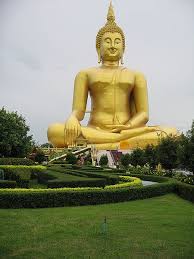These past few weeks I have been unable to hold the positive energy that normally moves so naturally through me. I confess, I have been discontented. This discontentment is nothing new really, for I am disgruntled once again about the same old sense of isolation I feel in my home bound daily life or about the incessant needs of children especially when expressed through crying and tantrums, or about the amount of time my husband gives to his job, or about money the fact is there are many of them-problems-that continually surface in my life. And when they rear their ugly little heads I process my emotions about each, talk with my spouse or vent to a friend, and I navigate a solution. I believe that I extinguish the issue, that it can be ticked off the To Do’ list; thus, when I find that I am once again dealing with the same old tired issue, I become disgruntled, discontent, and down right dislike-able.
There is an ancient story of a man who went in search of the Buddha
When he comes into company with the Illustrious One he begins to run through his life and ultimately, his myriad of problems. When he finishes the Buddha peacefully tells the man there is nothing he can do about his problems. Puzzled, the man begins a bit of a tirade; after all he sought out the Buddha to help him escape these problems. To this the Buddha replies that every person has problems, many problems. In fact, every person has exactly 83 problems. No matter what one may do to solve a problem, another problem will arise to take its place. This is just the way it is. However, smiling, the Buddha offers help with the man’s 84th problem the desire to have no problems.
This is the way of the Buddha

The reality is, I will forever have problems. Many will be repeat costumers, the same old baggage revisited, while other problems will move into and through my life leaving space open for different problems in their wake. According to the teachings of the Buddha, this is what it is to be human; it is the human condition. The Buddha teaches that it is not our problems themselves that cause us strife, but our deep-seated desire to be rid of our problems. I have given great thought to thisI have found a moment of enlightenment in the truth of it. It is not these actual problems that cause my dissatisfaction, it’s the problem I have with having these problems. You follow me?
So, I have a demanding son who not only cries, he screams I manage him well enough and in the end, I go on loving his spirit and I look forward to every new day in his company. The same is true with my one-going-on-two year old. So she tries to throw a few fits and she attempts to get her hands into everything that’s cool, because she really is learning a ton and super fun to be around. So my husband gives too much of himself to his job. He is passionate about what he does and in the end, it is his time and life energy to spendbe that anywhere he so desires. And who doesn’t stress about money? If I went through all of my problems, I might be amazed at how well I handle each; all except for that 84th problem…
The days I am down, disgruntled and discontent it is because I am wishing I had no problems. This is where from my pain and suffering arise, not from the problems themselves, but from a desire to eradicate said problems or from a desire to escape them all together. The only thing then to be done is to see my life for what it is, to see each problem for what it is and to stop wishing them away. It just ain’t gonna happen ever. When I accept this array of problems that pepper my incredibly blessed and wonderful life, it magically feels as though I have no problems at all. It is in the days that I master this Buddhist concept that I know true peace and happiness.





